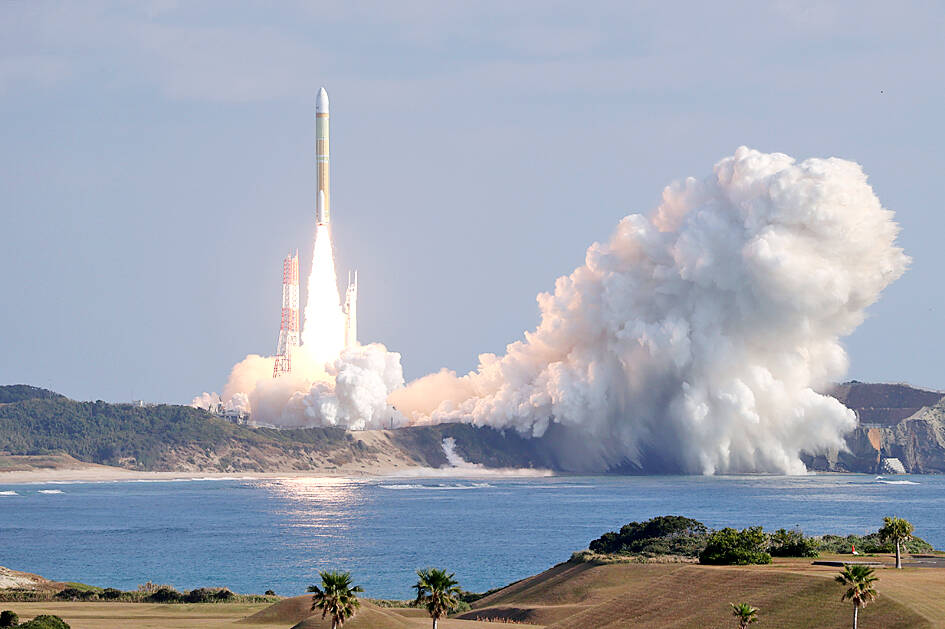Japan’s space agency yesterday toasted a successful blast-off for its new flagship rocket, making it third time lucky after years of delays and two previous failed attempts.
The next-generation H3 has been mooted as a rival to SpaceX’s Falcon 9, and could one day deliver cargo to bases on the moon.
“I’ve been in the space industry for a long time, but I’ve never felt so happy before, and I’ve never felt so relieved,” Japan Aerospace Exploration Agency (JAXA) president Hiroshi Yamakawa said.

Photo: EPA-EFE
The latest launch follows Japan’s successful landing last month of an uncrewed probe on the moon — albeit at a wonky angle — making it just the fifth country to land a craft on the lunar surface.
The H3 launched from the Tanegashima Space Center in southwestern Japan at 9:22am.
Cheers and applause could be heard from the JAXA control center after the agency’s livestream announced the H3’s engines had successfully burned, meaning the rocket had made it into orbit.
Developed jointly by JAXA and Mitsubishi Heavy Industries, the H3 is the successor to the H-IIA launch system, which debuted in 2001.
Designed for “high flexibility, high reliability and high cost performance,” the craft would “maintain Japan’s autonomous access to space,” JAXA said.
Unlike the reusable Falcon 9, the H3 is expendable, but scientists say the trial of its world-first technology is significant.
“The H3 rocket has a unique and novel first-stage engine that delivers greater thrust compared to state-of-the-art rockets,” said Michele Trenti, director of the University of Melbourne’s Melbourne Space Laboratory.
The H3 “has the potential to be the most cost-effective rocket,” making the exploration of the solar system more affordable.
Its maiden launch has been beset by mishaps. A launch in February last year was abandoned after ignition issues left the rocket standing motionless on the ground.
On the second try in March last year, technical problems meant a destruct command was issued shortly after blast-off.
Even this launch was postponed by four days due to bad weather.
The rocket which took off yesterday was carrying two small satellites. One of the microsatellites is expected to contribute to disaster prevention by taking photographs and videos.
The other, equipped with a sensor to detect infrared rays, is intended to track the operation conditions of factories on the ground.
Separation of the microsatellites was also confirmed, according to JAXA’s livestream.
“We will keep analyzing the sequences after successfully putting the rocket into orbit,” a JAXA official said.

Shamans in Peru on Monday gathered for an annual New Year’s ritual where they made predictions for the year to come, including illness for US President Donald Trump and the downfall of Venezuelan President Nicolas Maduro. “The United States should prepare itself because Donald Trump will fall seriously ill,” Juan de Dios Garcia proclaimed as he gathered with other shamans on a beach in southern Lima, dressed in traditional Andean ponchos and headdresses, and sprinkling flowers on the sand. The shamans carried large posters of world leaders, over which they crossed swords and burned incense, some of which they stomped on. In this

Near the entrance to the Panama Canal, a monument to China’s contributions to the interoceanic waterway was torn down on Saturday night by order of local authorities. The move comes as US President Donald Trump has made threats in the past few months to retake control of the canal, claiming Beijing has too much influence in its operations. In a surprising move that has been criticized by leaders in Panama and China, the mayor’s office of the locality of Arraijan ordered the demolition of the monument built in 2004 to symbolize friendship between the countries. The mayor’s office said in

‘TRUMP’S LONG GAME’: Minnesota Governor Tim Walz said that while fraud was a serious issue, the US president was politicizing it to defund programs for Minnesotans US President Donald Trump’s administration on Tuesday said it was auditing immigration cases involving US citizens of Somalian origin to detect fraud that could lead to denaturalization, or revocation of citizenship, while also announcing a freeze of childcare funds to Minnesota and demanding an audit of some daycare centers. “Under US law, if an individual procures citizenship on a fraudulent basis, that is grounds for denaturalization,” US Department of Homeland Security Assistant Secretary Tricia McLaughlin said in a statement. Denaturalization cases are rare and can take years. About 11 cases were pursued per year between 1990 and 2017, the Immigrant Legal Resource

‘RADICALLY DIFFERENT’: The Kremlin said no accord would be reached if the new deal with Kyiv’s input did not remain within the limits fixed by the US and Russia in August Ukrainian President Volodymyr Zelenskiy is to meet US President Donald Trump in Florida this weekend, but Russia on Friday accused him and his EU backers of seeking to “torpedo” a US-brokered plan to stop the fighting. Today’s meeting to discuss new peace proposals comes amidst Trump’s intensified efforts to broker an agreement on Europe’s worst conflict since World War II. The latest plan is a 20-point proposal that would freeze the war on its current front line, but open the door for Ukraine to pull back troops from the east, where demilitarized buffer zones could be created, according to details revealed by